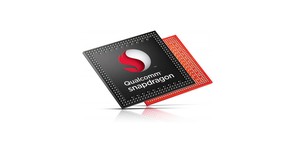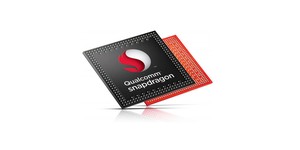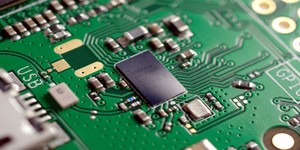Qualcomm ordered to refund BlackBerry £650M in royalty overpayments
April 13, 2017 | 11:02
Companies: #apple #blackberry #qualcomm

Qualcomm has been ordered to pay licensee BlackBerry £650 million, plus fees and interest, following a ruling that the company had forced BlackBerry to overpay licence fees relating to smartphone technologies.
Best known for its Snapdragon system-on-chip (SoC) parts, Qualcomm holds numerous patents on the technologies required to build a modern smartphone, including several which make up the core of the UMTS 3G cellular networking technology. While it is required in most countries to make these 'standard-essential patents' available under fair, reasonable, and non-discriminatory (FRAND) terms, its competitors - and occasionally customers - have accused it of failing to do so, leading to several fines from countries' anti-monopoly commissions, an ongoing FTC suit, and three active lawsuits filed by Apple in the US, UK, and China.
While actively fighting these filings, including filing a counter-claim of its own against Apple, Qualcomm has been in arbitration with licensee BlackBerry over claims it forced the company to overpay fees totalling over £650 million. The core of the dispute, Qualcomm has detailed, revolves around 'prepayment of royalties for sales of a specific number of subscribers units from 2010 through the end of 2015,' prepayments BlackBerry believed it was owed back due to lower-than-expected sales but which Qualcomm argued it had a right to keep and has described as 'non-refundable.' Late yesterday, both companies announced the interim outcome of the arbitration: the repayment of $814,868,350 (around £650 million) in royalty overpayments, plus yet-to-be-declared interest and attorneys' fees.
Sadly for Apple, Qualcomm at least believes the ruling will have little impact on its ongoing fight. 'The arbitration decision was limited to prepayment provisions unique to BlackBerry's licence agreement with Qualcomm,' the company has claimed in its official statement on the ruling, 'and has no impact on agreements with any other licensee.'
'Lawsuits involving standard essential patents are increasingly common. As the technology becomes entrenched, precisely because it is the standard, potentially competing technologies are by-passed, leaving licensees with no alternative,' explained Harness Dickey principal Bryan Wheelock of the growing number of cases against Qualcomm and other holders of standard essential patents. 'This distorts normal royalty rate negotiations, and spawns disputes. As the market matures and margins drop, the royalty rate becomes an irritant.'
BlackBerry, meanwhile, has stated that it has no intention of severing its relationship with Qualcomm over the overpayments. 'BlackBerry and Qualcomm have a longstanding relationship and continue to be valued technology partners,' John Chen, BlackBerry chief executive, said of the companies' relationship. 'We are pleased the arbitration panel ruled in our favour and look forward to collaborating with Qualcomm in security for ASICs and solutions for the automotive industry.'
Best known for its Snapdragon system-on-chip (SoC) parts, Qualcomm holds numerous patents on the technologies required to build a modern smartphone, including several which make up the core of the UMTS 3G cellular networking technology. While it is required in most countries to make these 'standard-essential patents' available under fair, reasonable, and non-discriminatory (FRAND) terms, its competitors - and occasionally customers - have accused it of failing to do so, leading to several fines from countries' anti-monopoly commissions, an ongoing FTC suit, and three active lawsuits filed by Apple in the US, UK, and China.
While actively fighting these filings, including filing a counter-claim of its own against Apple, Qualcomm has been in arbitration with licensee BlackBerry over claims it forced the company to overpay fees totalling over £650 million. The core of the dispute, Qualcomm has detailed, revolves around 'prepayment of royalties for sales of a specific number of subscribers units from 2010 through the end of 2015,' prepayments BlackBerry believed it was owed back due to lower-than-expected sales but which Qualcomm argued it had a right to keep and has described as 'non-refundable.' Late yesterday, both companies announced the interim outcome of the arbitration: the repayment of $814,868,350 (around £650 million) in royalty overpayments, plus yet-to-be-declared interest and attorneys' fees.
Sadly for Apple, Qualcomm at least believes the ruling will have little impact on its ongoing fight. 'The arbitration decision was limited to prepayment provisions unique to BlackBerry's licence agreement with Qualcomm,' the company has claimed in its official statement on the ruling, 'and has no impact on agreements with any other licensee.'
'Lawsuits involving standard essential patents are increasingly common. As the technology becomes entrenched, precisely because it is the standard, potentially competing technologies are by-passed, leaving licensees with no alternative,' explained Harness Dickey principal Bryan Wheelock of the growing number of cases against Qualcomm and other holders of standard essential patents. 'This distorts normal royalty rate negotiations, and spawns disputes. As the market matures and margins drop, the royalty rate becomes an irritant.'
BlackBerry, meanwhile, has stated that it has no intention of severing its relationship with Qualcomm over the overpayments. 'BlackBerry and Qualcomm have a longstanding relationship and continue to be valued technology partners,' John Chen, BlackBerry chief executive, said of the companies' relationship. 'We are pleased the arbitration panel ruled in our favour and look forward to collaborating with Qualcomm in security for ASICs and solutions for the automotive industry.'

MSI MPG Velox 100R Chassis Review
October 14 2021 | 15:04








Want to comment? Please log in.